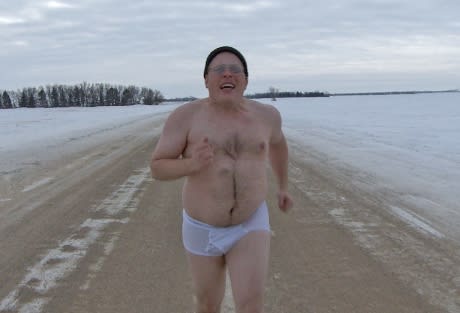When Prairie Love opens amidst a cold, wide-open expanse, substituting for a cold, lonely world, a voiceover points out the original American settlers did their best to traverse the prairies during the summer months, but would occasionally have difficulties and wind up trapped, alone in the winter abyss. This theme of losing one's way and winding up alone is what drives this achingly, uncomfortably frank and deceptively simple drama, focusing on the interactions between three deeply damaged and lonely characters. None of them are given much back-story to contextualize their current plight, yet their actions and consistent demonstration of socially inappropriate or awkward behaviour speak for themselves, allowing the actions to drive the story rather than exposition. Everything starts with a pseudo-vagrant (Jeremy Clark) happening upon the nearly frozen Nathaniel (Garth Blomberg) in the middle of an empty, snow-covered road. Stripping him down and throwing him in front of a heater in his dilapidated truck, the man drives forward through the prairies without any set destination, reading some correspondence between Nathaniel and a female prison inmate that he finds in the frozen stranger's luggage. Once Nathaniel wakes up, responding discomfortingly to the invasion of his personal property, the two engage in increasingly awkward, but sincere exchanges, both demonstrating an inability to communicate with ease. Of course, as is the trajectory of this story, neither party is able to establish any sort of connection, which leads to the twist and ultimate downfall of both men when the vagrant leaves Nathaniel to freeze, pretending to be him when his female pen pal is released from prison, hoping to find love under the most misguided and insincere pretence. And since these characters carry their emotional baggage with them wherever they go, the vagrant demonstrates similar social ineptitude with the damaged, presumed sexual abuse victim (Holly Lynn Ellis) he hopes to find love with. As the title suggests, the notion of "prairie love" is that of settling for what you can find, with the visual representation of freezing standing in for annihilation anxiety — a fear of dying alone made real. As such, even if these characters choose to stay with each other, ignoring the false pretences and astounding incongruity of it all, it still doesn't mean a happy ending. What we have here is a story about people left at the sidelines by a cold world unwilling to reach out and help. Unable to interpret or appreciate healthy connections after a lifetime of abuse and isolation, they are left to perpetuate cyclic self-loathing and misanthropy regardless of how long they travel and how hard they search for connections. It's a tragedy created by the rigid expectations of social performance and the limited give for difference and lack of patience in helping those on the periphery. Similarly tragic is the very short animated film included with the DVD, A Family Portrait, wherein intense scrutiny of a seemingly idyllic nuclear family shows fraying around the edges.
(Film Movement)Prairie Love
Dusty Bias

BY Robert BellPublished Dec 13, 2012



